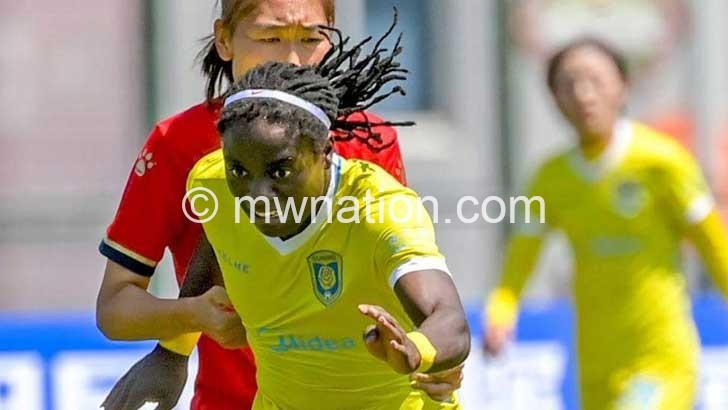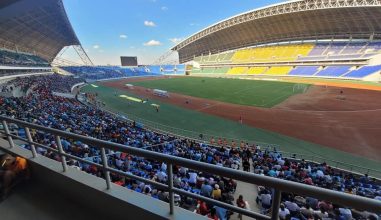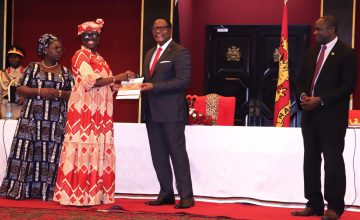Female athletes suffer in silence
- I was stripped to prove I’m a girl—Tabitha
For many of the country’s aspiring women football players, China-based star Tabitha Chawinga is their idol because of what she has achieved in her career.
But little do they know that behind her success, there is a story of abuse, harassment and discrimination that almost led her to quit the sport altogether.

The Wuhan striker opened up on how she was not accepted in women’s football as opposing teams could not believe she was a girl.
When she started playing the game in 2009 at her home village in Rumphi, a match was stopped as the opponents could not believe a girl could have the exceptional football skills she has.
“They took me to a room where they stripped me to check if I was indeed a girl,” she said.
Tabitha said the ordeal forced her to quit women’s football for 10 months.
When she resumed playing, she played for boys’ teams because she was not victimised.
But her discrimination continued off the pitch as the community accused her of having loose morals since she was playing football with boys.
In 2012, Chawinga was spotted by Lilongwe-based women’s football team DD Sunshine while playing for a boy’s teams in Rumphi.
The club signed her and she moved to the capital city.
With the ordeal in Rumphi now in the past, Chawinga felt she could now enjoy her game without any hassles.
However, she met a similar predicament while playing in a Women’s Presidential Cup match at Civo Stadium.
She said: “This time I was stripped right on the pitch as the other team protested, saying I was not a girl.”
The 25-year-old said what was disappointing was that the incident happened in full view of women’s football officials.
“I don’t want to mention their names. But they were there and they know themselves. Some still hold positions in women’s football. I just don’t want any other player to experience what I went through. Even if it means taking people who do this to court. People must accept how God created each one of us,” Chawinga said.
DD Sunshine coach Andrew Chikhosi recalls that they lodged a complaint to the Central Region Women’s Football Committee (CRWFC), but no action was taken.
CRWFC general secretary (GS) Bertha Kawanga referred the matter to the then GS Shambase Kadzamira on why no disciplinary action was taken against those who stripped Chawinga.
When contacted, Kadzamira brushed off the incident saying she doesn’t remember.
“That was a long time ago. I can’t remember,” she said.
On her part, National Women’s Football Association chairperson Suzgo Ngwira said stripping the player was gross indiscipline which should not have gone unpunished.
She said: “It’s a disciplinary issue and cannot be tolerated as it is an infringement of someone’s human rights.”
Football Association of Malawi (FAM) GS Alfred Gunda condemned the practice, saying the association has zero tolerance on any form of player harassment.
He said: “The issue of some people doubting players’ gender is indeed there. It’s a problem of our society. There is a perception that someone cannot perform well if she is a girl. As FAM we accord equal opportunities to all players in their respective fields as well as ensure that their rights are safeguarded.”
The GS, however, acknowledged cases where the need for verification of players’ gender may arise, and that there is a committee that is responsible for handling such issues.
“And if cases where there are doubts of gender arise, as organised football, there are channels of how to present such grievances. People should not take matters into their hands. There are professionals who are better placed to do that and not stripping someone. That is inhumane and unacceptable.”
Gunda encouraged players who face abuse to come out in the open immediately, rather than suffering in silence.
“We would like players—both male and female—to report the matter once they feel their rights have been infringed upon. But if there is abuse or people don’t come out, it will be very difficult for the system to help.”
Will FAM take action on those responsible for what happened to Chawinga?
Gunda said: “Look, we are now talking of something that happened eight years ago. Some people have moved out of the system [while] some have even died. How do we take them to task? We hope more players can come out immediately such things happen so that they are dealt with there and then.”
Chawinga’s experience is not an isolated one. Women in sports face numerous forms of abuse both within and outside their sports codes.
Athlete Asimenye Simwaka, who is representing Malawi at the Tokyo Olympics in Japan, also reveals her experiences, not different from that of Chawinga.
“It’s very tough for us. People do not believe we are girls just because of our athletic bodies.
“We are abused on social media once we post pictures. Even in our communities, I can’t go in public without people making fun of how I look.
“It’s a pity that they do that to us when we were all created in the image of God,” explains Simwaka who is also aMalawi women’s football national team player.
Athletics Association of Malawi (AAM) acting general secretary Mzee Makawa said they hasvelost promising female athletes due to abuse and harassment.
He said: “One moment you have a promising female athlete, next thing she is pregnant and has dropped out of school. In the latest incident we have lost a good athlete from Nsalu in Lilongwe due to the same issue. Unfortunately, it is difficult to help them because the girls prefer keep ing quiet no matter how much we try to let them open up on their experiences.
“Others just drop out due to the incessant abuse on how they look as a result ofthe strenuous exercises in athletics. We try to encourage them to look beyond that and focus on the benefits that come with being an athletics star, but very few can withstand the pressure. It’s just too much for the girls.”





